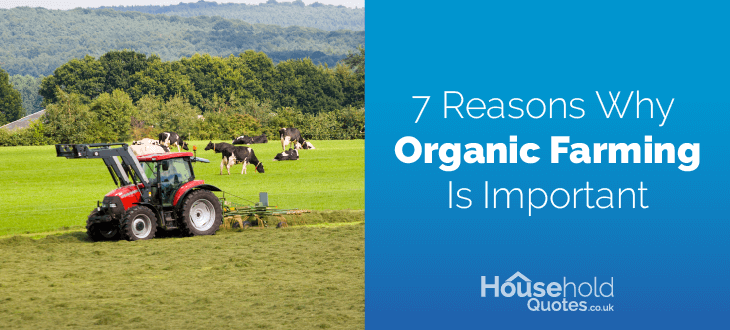- Householdquotes.co.uk
- Blog
- Why organic farming is important
Seven Reasons Why Organic Farming Is So Important


Walking around a massive supermarket makes it easy to forget where our food comes from. We find it hard to imagine what the finished product we see today looked like just weeks or even days ago. Farmers work around the clock to ensure we have items such as meat, vegetables, fruit and much more readily available. However, this demand for produce is causing a serious negative impact on the environment.
Traditional farming has been accused of being one of the top causes of climate change, as well as being criticised for its serious ill-treatment of animals. However, there is an alternative. Organic farming prioritises good healthy produce, made in a sustainable environment. We’re going to take a dive in and examine why this is so important. Here are seven reasons why organic farming is crucial:
1. Healthier animals and meat
On organic farms, livestock are free to roam in an appropriate-sized space whereas on non-organic farms animals can be kept in cramped conditions. Animals are also fed healthier foods, they are left to feed on the natural grass, as well as certified organic feed.
These farms allow animals to live a more natural life. The happiness of animals is said to improve the quality of meat. This brings comfort to the average consumer, knowing that their food is coming from a humane environment where animals get to live a good life.
2. Reduces pollution
According to the United Nations Food and Agricultural Organisation, 14% of global emissions come from meat and dairy production. This is down to fertilisers, livestock emissions (such as methane from cows) and animal waste. A lot of waste from farming can find its way into local rivers, severely polluting the water which causes damage to its inhabitants.
Sympathetic fertilisers that damage the environment are not used on organic farms. Animal waste is also disposed of properly to avoid causing a hazardous problem for the local area.
3. Reduced energy and water usage
Organic farms tend to use eco-friendly alternatives when looking to save money on their bills. Solar energy is something which is widely implemented, this harvests energy from the sun allowing farms to be powered without the use of fossil fuels. Rainwater harvesting systems help to reduce water usage, they collect rainwater (normally from the roof), before filtering for use around the farm.
4. Reduces the use of chemicals
Regular farms use pesticides to kill bacteria and insects that feed on the produce. This chemical can get on and into the food being grown, which ultimately gets into our bodies. This chemical is toxic to us humans, as well as other important members of the ecosystem like bees. A Guardian article reported that over 50 billion bees were killed in the Winter of 2018-2019, which was the highest number since 2000.
Pesticides are not used at organic farms, instead they use natural levels of pest control only when necessarily required. This ensures that those toxic chemicals are not getting into the food you’re consuming.
5. No GMOs
Genetically modified organisms (GMOs) are used by farmers to fight against problems like adverse weather conditions, diseases and pests. However, the knowledge of the effects GMOs have on the human body is not extensive. There have been concerns that they can contribute to cancer. Some consumers have suffered allergic reactions from GMO foods, this happens when genetic change causes the production of an allergen.
Non-GMO farms such as organic farms ensure that consumers don’t have to worry about side effects from the way produce is grown.
6. Maintains healthy soil
Regenerating soil health is a top priority for organic farmers, organic farms are designed to help build natural fertility, plant health and nutrient recycling. This ensures that the farming land can be used for years to come, offering a more sustainable way of farming.
7. Fairness
This way of farming calls for fairness to each individual party involved, including; the farmer, traders, consumers and suppliers. It encourages good working relationships as well as good standard working conditions for farmers. Organic food generally costs more, but that money is to ensure that everyone involved in the production process is paid fairly for their efforts.

Josh Houston is a writer at Household Quotes whose passionate about the world of renewable energy, energy saving solutions and home improvements. He specialises in providing useful tips that our readers can adopt for their own needs. His skills involve translating complex topics to something more understandable.
